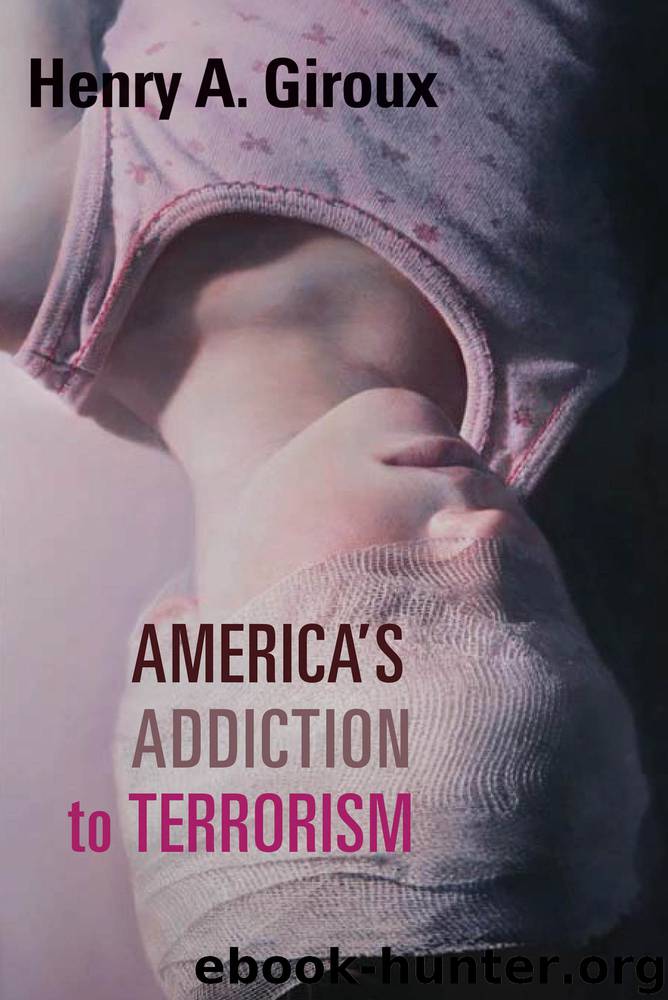America's Addiction to Terrorism by Giroux Henry A.;

Author:Giroux, Henry A.;
Language: eng
Format: epub
Publisher: Monthly Review Press
Published: 2016-04-07T16:00:00+00:00
8
Academic Terrorism, Exile, and the Possibility of Classroom Grace
IDEOLOGICAL FUNDAMENTALISM AND political purity appear to have a strong grip on society in both the United States and Canada.1 This can be seen in the endless attacks on reason, truth, critical thinking, informed exchange, and dissent itself. The endpoint of such attacks can be grasped in comments in which an academic at West Point publishes a paper claiming, without irony, that dissident intellectuals should be the subject of drone attacks.2 As bizarre as this appears, the ideology that informs it was on full display when Wesley Clark, a liberal and former presidential candidate, called for internment camps for “radicalized Americans.”3 While such comments appear extreme, there is an element of truth in these extremes that points to the dark side of American politics and culture. Paraphrasing Theodor Adorno, there is always some truth to be found in such exaggerations. Such attacks are not just endemic to the United States. Canada’s prime minister, Stephen Harper, routinely attacks intellectuals and journalists whom he says are “committing sociology” by including critical analysis in their communication of facts and statistics—in other words, critics who are intelligent enough to value context, brave enough to hold power accountable and take seriously their role as engaged public intellectuals. Insinuating that sociological analysis is tantamount to “committing” an egregious sin, if not a criminal act, becomes a way for Harper and his conservative cronies to argue for the condemnation and removal of critical thought from both the university and public discourse. His disdain for any form of scientific evidence proving that climate-warming trends are due to human activities has resulted in the Canadian government banning federal scientists from sharing their findings with their colleagues and the public. For fear that scientists might provide evidence that climate change is the result of human activity over the past century, the government has banned them from releasing their research or talking publicly about their work.4 The Canadian government’s defense of dirty oil has become synonymous with an act of brazen censorship.
Comments like Canada’s prime minister’s provide only a glimpse of a wholesale ideological and policy shift by the Canadian federal government under his conservative leadership. A number of scientists and academics have indicted the Harper government for what increasingly appears to be its systematic suppression of ideas that challenge Harper’s views on climate change. They have pointed to “a pattern that has seen the . . . government reduce media access to scientists and cut funding and programs.” 5 In this instance, scientists are being censored because they have provided evidence for the destructive effects of climate change, among other social and environmental research that might put into question a lack of government response and proper oversight regarding corporate power, industrial development, and financial markets.
In the United States political illiteracy seems to be the one qualification, besides great wealth, that gets one elected to political office. For example, prominent Republican Party politicians from Marco Rubio to Scott Walker deny that climate change
Download
This site does not store any files on its server. We only index and link to content provided by other sites. Please contact the content providers to delete copyright contents if any and email us, we'll remove relevant links or contents immediately.
| Elections & Political Process | Ideologies & Doctrines |
| International & World Politics | Political Science |
| Public Affairs & Policy | Specific Topics |
| United States |
The Secret History by Donna Tartt(18276)
The Social Justice Warrior Handbook by Lisa De Pasquale(11970)
Thirteen Reasons Why by Jay Asher(8494)
This Is How You Lose Her by Junot Diaz(6479)
Weapons of Math Destruction by Cathy O'Neil(5875)
Zero to One by Peter Thiel(5521)
Beartown by Fredrik Backman(5394)
The Myth of the Strong Leader by Archie Brown(5257)
The Fire Next Time by James Baldwin(5044)
How Democracies Die by Steven Levitsky & Daniel Ziblatt(4985)
Promise Me, Dad by Joe Biden(4924)
Stone's Rules by Roger Stone(4883)
100 Deadly Skills by Clint Emerson(4716)
A Higher Loyalty: Truth, Lies, and Leadership by James Comey(4579)
Rise and Kill First by Ronen Bergman(4563)
Secrecy World by Jake Bernstein(4423)
The David Icke Guide to the Global Conspiracy (and how to end it) by David Icke(4417)
The Farm by Tom Rob Smith(4341)
The Doomsday Machine by Daniel Ellsberg(4269)
